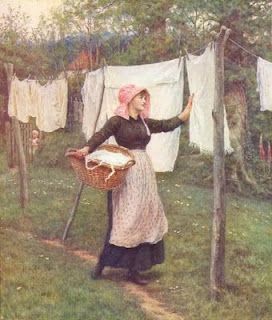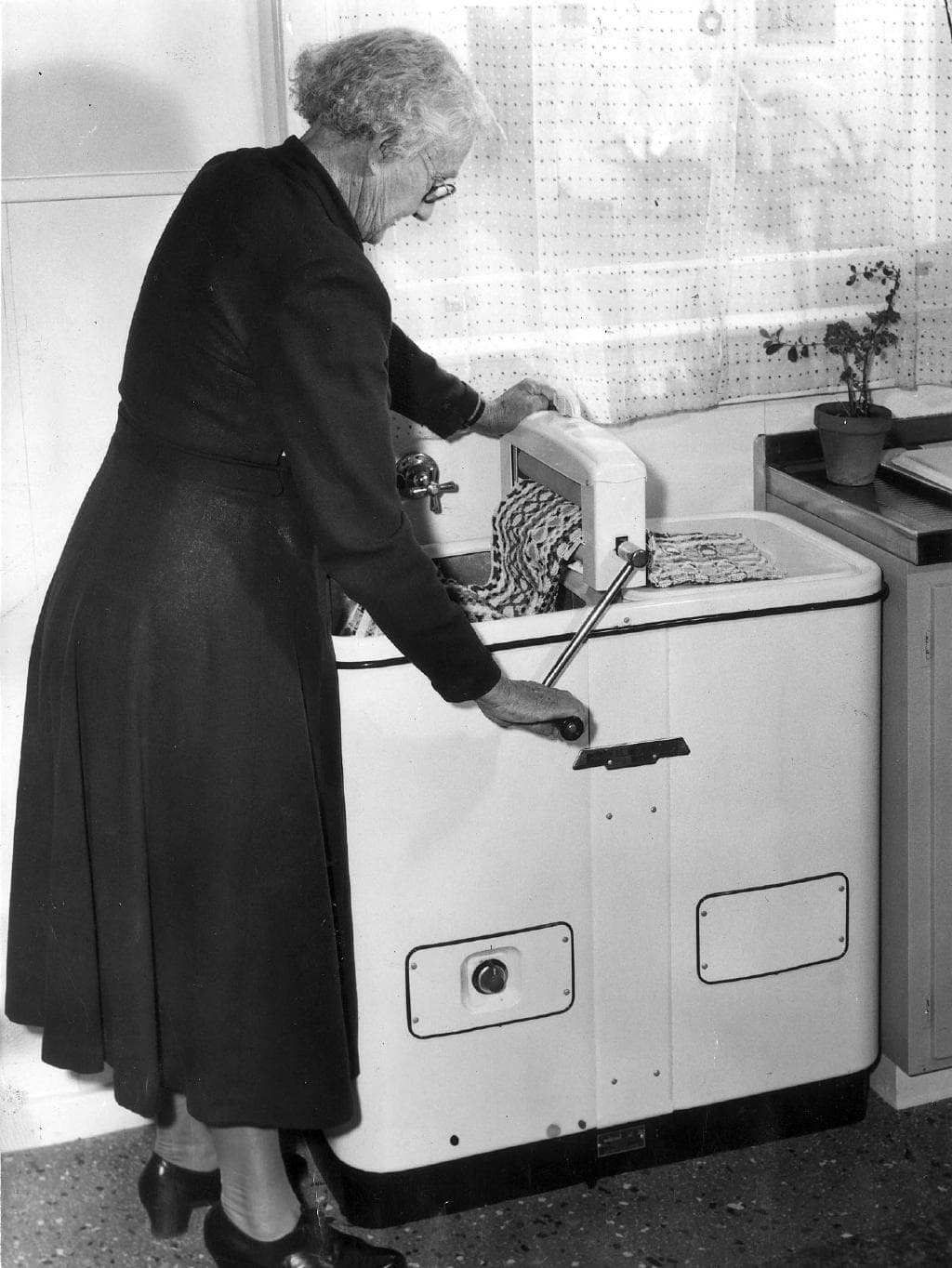Are You Overwhelmed with Laundry?
Laundry Class?
Years ago, I attended BYU Education Week in Provo, Utah, which had over two hundred excellent instructors teaching over 1,000 interesting subjects. One of the classes, which I felt a little foolish attending since there were so many other wonderful classes I could have taken that hour, was about how to do laundry.
The classroom was overflowing with women (and a few men) who wanted to learn how to get a handle on doing laundry. A second over-flow classroom had to be opened up to accommodate those who kept streaming in to attend this four-day class. I picked up a few tips from the woman who was teaching the class, and although I didn’t incorporate all her ideas, it did stimulate my own creative thinking on doing laundry.
The “laundry instructor” said she had one designated day a week when she did all her family’s laundry. For years, Tuesday was laundry day. She gathered, sorted, washed, dried, mended, folded, and put laundry away all on one day. From early morning until late at night, she focused on getting the laundry completed. Then she didn’t think about laundry again until the next Tuesday.
After several years of being on this schedule, she was asked to be involved in a community project that had their meetings on Tuesdays. She agreed to participate, but she still kept trying to keep her Tuesday laundry-day schedule. After many weeks of frustration of trying to do both, it occurred to her that laundry day didn’t HAVE to be on Tuesday. She could change it to a different day of the week! She did change it, and her serenity returned.
Stressed Out?
What I learned most from that class was how many families were stressed out about keeping up with the laundry. I went away determined to simplify the process of doing laundry in my home. I knew I couldn’t do all my family’s laundry on one day because I had so many children, and I didn’t have a consistent routine in my home because of my husband’s frequent traveling schedule.
I started thinking back to the time when I only had two children and had met a young boy in the laundromat of our apartment complex in Northridge, California. As I started doing my laundry, I wondered why he was in there by himself. When a couple of washing machines stopped, he transferred the wet clothes into the dryers. Surprised at seeing him do this, I asked him, “Are you doing your own laundry?”
He said, “Yes, but not just mine. I’m doing my family’s laundry, too.”
I asked him incredulously, “You are doing all your family’s laundry???”
He smiled and proudly answered, “Yes! It’s my job.”
I then asked him, “How old are you?”
Standing up straight, he confidently looked me in the eye and replied, “I’m eight.”
Children Do Laundry?
Up to that time, it had never occurred to me that children could be taught to do laundry. I decided not to start at age eight, but at age ten, to teach my children how to do their own laundry. (However, I had one seven-year-old daughter who took it upon herself to do her own laundry after I shrunk her favorite dress! She had been watching her older siblings do their laundry and decided she could do a better job than I did!)
When my older children would complain about having to do their own laundry, because none of their friends had to do their laundry, I would just smile and say, “You’ll thank me when you go to college. While all the other new students are stressed out trying to understand how to use a washer and dryer, you can be out having fun.”
A Thank You?
Once I started this new laundry routine, I would help my older kids with their laundry from time to time when they were really busy with school, sports, or extracurricular activities. The nice thing was that I would always get a “thank you” from them when I would help them.
When I used to do all the laundry myself, I never got a "thank you" from any of my children...although my sweet husband would always thank me for doing his laundry!
It’s actually ironic that with the invention of the automatic washing machine and clothes dryer, we're more stressed out than ever with doing laundry. Below are a few of my ideas that might help relieve your stress. While these ideas might not work for you, hopefully they will stimulate your own creative ideas on how to simplify doing laundry in your home.
Excerpt from “Homemaking Made Simple” —Clothing & Laundry
1. We have to wear clothes.
Life would be simpler if we didn’t, but for modesty’s sake and adjusting to weather changes, we have to deal with a variety of clothing. Keep clothing simple. Having too many clothes can be more stressful than having too few clothes. I had a friend in high school who had wealthy parents, but she wore the same clothes every week. She said she was only allowed to have a one-week supply of clothes.
2. To economize, try to buy clothing when it is on sale.
Always buy clothes that are a little too big because they always seem to shrink a little or kids have a sudden growth spurt and the new clothes no longer fit. Clothes that don’t fit, which you want to save for another child, should be boxed up and stored (and hidden) so your kids aren’t dumping them out and making a mess. Clothing that isn’t being saved for another child should be given away immediately.
3. If you have the closet space, hang clothes instead of folding them.
Children can see at a glance what they have available to wear. Hang a low rod in children’s closets. Kids often tear their drawers apart looking for a certain item of clothing.
4. Teach kids to help with their own laundry.
By the age of eight, kids are capable of running a washer and dryer. You can be their “assistant” and have some one-on-one time with them as you chat about their day while you help them do their laundry.
5. Sock Training
Train yourself, your husband, and your kids to roll their socks together when they take them off their feet (or stuff one sock into the other one). The best way to insure both socks come out of the washing machine and dryer is to pin them together with a large safety pin.
But even if you don’t pin the socks together, usually both socks do make it through the washer and dryer if they have been rolled together in the first place. Mating socks can be a fun “matching game” if done when you’re not in a rush.
6. Wash younger kids' clothing about once a week.
I say “about” because I never have been able to get on an exact schedule! But if I wash every seven or eight days, it seems to work out best. I agree that a one-week supply of clothes is enough (although it wasn’t a rule in our home). I did like to have a ten-day supply of socks and underclothes on hand for everyone just in case I didn’t get the laundry done on time.
7. Wash one child’s clothes at a time—one batch of "lights/whites" and one batch of "darks/colors"—and have that child assist you.
I have two small laundry baskets in each person’s room, so the laundry is already sorted and ready to wash. If clothing has stains that need to be pre-treated, it’s good to hang these items over the edge of the basket so they’re easier to find.
It’s not so hard to wash clothes. The hard part of laundry is folding and putting all the laundry away. If you know all the clothes in the dryer are going into one child’s bedroom, this eliminates a lot of the hassle.
I originally made all my kids laundry bags that were divided in two parts for sorting. These bags never worked because they thought it took too much time to open the bag! Laundry baskets were much faster when tossing in dirty laundry.
8. Wash certain things on certain days.
I don’t like to do all the laundry on one day. Space it out throughout the week. Preferably, I only do a maximum of two batches of clothes a day. That’s about all I have time to wash, dry, and put away (or help a child to do so).
Items like towels (that don’t have to be folded right away) can be washed and left in the dryer till you have more time to fold them. If your clothes do sit in the dryer too long and get wrinkled, you can turn on the dryer again with a clean, damp wash cloth to get the wrinkles out.
9. Choose what you want to fold and what you don’t want to fold.
It’s nice to fold (or hang up) outer apparel (shirts, pants, dresses, etc.) so they don’t get wrinkled. Folding everything else is optional.
Pajamas, underclothes and socks can be thrown into a drawer when you don’t have time to fold them. The same goes for towels, wash clothes, dish clothes, dish towels, sheets, etc. While it’s nice to look at everything when it’s folded, life will go on just fine if these items are just tossed into a drawer or cupboard.
10. Wash towels together on hot and dry them on high heat to get rid of the germs.
If towels stink, even after they are washed, they will probably need some chlorine bleach to get rid of the smell. Fill the washing machine up with hot water, detergent, and two tablespoons of bleach and let the machine swish the water around for a minute. Then add the smelly towels. This way you won’t get bleach spots on the towels (which I’ve done too many times!)
11. Washing sheets.
You have to decide how often to wash your sheets. I like to wash my own sheets once a week and have someone help me remake the bed (which goes much faster with another person on the other side of the bed.)
I would wash my kids’ sheets once a month because they didn’t seem to care if their sheets were clean or not. However, I would give my kids baths every night to wash away all the germs from their day’s activities and help them sleep more comfortably throughout the night—and this way their sheets didn’t get very dirty.
If kids go to bed unwashed or sleep in dirty clothes, then you should wash their sheets more often. If someone is sick, their sheets should be washed daily to get rid of the germs. If you don’t have time to wash their sheets, at least wash their pillow cases. If someone wets the bed or throws up on the bedding, it’s best to wash everything immediately (or first thing in the morning.) This is one job that only gets worse if left undone!
I prefer to wash and dry sheets and put the same ones back on the bed, so I don’t have to fold them. When I get bored with that set of sheets, then I use a second set of sheets for several weeks in a row.
12. Washing your own clothes.
I have learned to hang my pants and shirts over the side of the laundry basket instead of throwing them in. If I don’t have time to wash these clothes, and they are not too dirty, I will wear them again if necessary—at least they aren’t all crumpled up and wrinkled.
I like to wash my husband and my clothes together since we do share the same bedroom. When I'm too busy, he assumes responsibility for washing our clothes. Teamwork!

